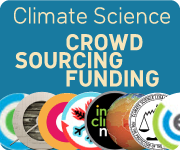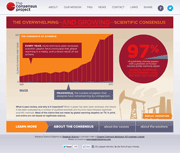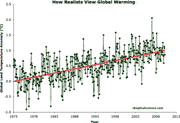2014 SkS Weekly News Roundup #40B
Posted on 4 October 2014 by John Hartz
- A change in the climate
- Beyond treaties: A new way of framing global climate action
- Canada switches on world's first carbon capture power plant
- Climate science is settled enough
- Curbing climate change requires "complete transformation"
- Deep, hidden trench discovered beneath Antarctic glacier
- Earth has lost half of its wildlife in the past 40 years, says WWF
- How the effects of climate change in Arctic Canada are shrinking polar bears
- Marathon walk to storm-hit city spotlights Philippine climate risks
- Merkel adviser lashes Abbott's 'suicide strategy' on coal
- Neglected disaster plan deepens Pakistan's climate vulnerability
- Scientists say greenhouse gases most likely worsen California drought
- Scientists speed up analysis of human link to wild weather
- Sea-ice shortage sends thousands of walruses swarming Alaska beach
- Sri Lanka launches $100 million climate resilience effort
A change in the climate
Less than two weeks have passed and yet it isn’t too early to say it: The People’s Climate March changed the social map — many maps, in fact, since hundreds of smaller marches took place in 162 countries. That march in New York City,spectacular as it may have been with its 400,000 participants, joyous as it was, moving as it was (slow-moving, actually, since it filled more than a mile’s worth of wide avenues and countless side streets), was no simple spectacle for a day. It represented the upwelling of something that matters so much more: a genuine global climate movement.
When I first heard the term “climate movement” a year ago, as a latecomer to this developing tale, I suspected the term was extravagant, a product of wishful thinking. I had, after all, seen a few movements in my time (and participated in several). I knew something of what they felt like and looked like — and this, I felt, wasn’t it.
I knew, of course, that there were climate-related organizations, demonstrations, projects, books, magazines, tweets, and for an amateur, I was reasonably well read on “the issues,” but I didn’t see, hear, or otherwise sense that intangible, polymorphous, transformative presence that adds up to a true, potentially society-changing movement.
It seemed clear enough then: I could go about most of my life without brushing up against it. Now, call me a convert, but it’s here; it’s big; it’s real; it matters.
A Change in the Climate by Todd Gitlin, The Huffington Post/TomDisptach.com, Oct 2, 2014
Beyond treaties: A new way of framing global climate action
As negotiators look to next year’s UN climate conference in Paris, there is increasing discussion of a new way forward that does not depend on sweeping international agreements. Some analysts are pointing to Plan B — recasting the climate issue as one of national self-interest rather than global treaties.
Beyond Treaties: A New Way of Framing Global Climate Action by Fred Pearce, Yale Environment 360, Sep 29, 2014
Canada switches on world's first carbon capture power plant
Canada has switched on the first large-scale coal-fired power plant fitted with a technology that proponents say enables the burning of fossil fuels without tipping the world into a climate catastrophe.
The project, the first commercial-scale plant equipped with carbon capture and storage technology, was held up by the coal industry as a real life example that it is possible to go on burning the dirtiest of fossil fuels while avoiding dangerous global warming.
Saskatchewan’s state-owned electricity provider is due to cut the ribbon on the $1.3 billion Canadian project on Thursday. But officials from SaskPower International Inc told guests invited to the ceremony the 110 megawatt plant went live on Tuesday night.
Canada switches on world's first carbon capture power plant by Suzanne Goldenberg, The Guardian, Oct 1, 2014
Climate science is settled enough
When the Wall Street Journal publishes yet another argument for doing nothing about global warming, it’s just a dog-bites-man story. So why should anybody get particularly exercised by the Journal’s latest incarnation of this fixed idea, in the form of an extended essay by Steve Koonin? It was to be expected that the Journal would try to take some pre-emptive action on the eve of the opening of the United Nations Climate Summit in New York and theworld’s largest climate-action rally. What makes Koonin’s piece noteworthy more than anything else is the messenger.
Steve Koonin is the answer to a troublesome question facing the Journal’s opinion page editors: What you do if you want to continue obstructing progress on global warming pollution, but your usual stable of tame skeptics is starting to die off (Fred Seitz), retire from active research (Dick Lindzen), or discredit itself through serial scientific errors (John Christy) or by taking fanatical and manifestly untenable positions (Heartland Institute)? That puts the editors in quite a pickle. The Wall Street Journal evidently has high hopes for promoting Koonin as a prominent new voice for inaction, having lavished on him 2,000 words and front-page Saturday exposure outside the Journal’s paywall.
Who is Steve Koonin and why should we care?
Climate science is settled enough by Raymond T. Pierrehumbert, Slate, Oct 1, 2014
Curbing climate change requires "complete transformation"
The world must revolutionise the way it pursues economic development by shifting to a far cleaner model if it is to put the brakes on global warming, according to a top U.N. environment official.
Kaveh Zahedi, regional director and representative for Asia and the Pacific at the United Nations Environment Programme (UNEP), spoke with the Thomson Reuters Foundation on the sidelines of the Asia-Pacific Climate Change Adaptation Forum 2014 in the Malaysian capital this week.
The Iranian-British official, who directs UNEP's projects in 39 Asia-Pacific countries, talked to correspondent Thin Lei Win about what’s already being done in the region to cope with climate impacts, and what the international community should do next.
Q&A: Curbing climate change requires "complete transformation" - UNEP official by Thin Lei Win by Thin Lei Win, Thomson Reuters Fioundatuion, Oct 3, 2014
Deep, hidden trench discovered beneath Antarctic glacier
Ice-penetrating radar has uncovered a previously unknown ice-covered trench, and other detailed terrain, in the bedrock hidden beneath two massive, bluish glaciers in Greenland and Antarctica.
The gaping features were revealed in the first, highly detailed 3D maps of the frozen bedrock — the land under Greenland's Jakobshavn Glacier and Antarctica's Byrd Glacier —which may help researchers predict howglaciers, ice sheets and sea levels may change in the future.
"Without bed topography, you cannot build a decent ice-sheet model," lead researcher Prasad Gogineni, director of the Center for Remote Sensing of Ice Sheets (CReSIS) at the University of Kansas, said in a statement.
Deep, Hidden Trench Discovered Beneath Antarctic Glacier by Laura Geggel, Live Science, Oct 1, 2014
Earth has lost half of its wildlife in the past 40 years, says WWF
The number of wild animals on Earth has halved in the past 40 years, according to a new analysis. Creatures across land, rivers and the seas are being decimated as humans kill them for food in unsustainable numbers, while polluting or destroying their habitats, the research by scientists at WWF and the Zoological Society of London found.
“If half the animals died in London zoo next week it would be front page news,” said Professor Ken Norris, ZSL’s director of science. “But that is happening in the great outdoors. This damage is not inevitable but a consequence of the way we choose to live.” He said nature, which provides food and clean water and air, was essential for human wellbeing.
“We have lost one half of the animal population and knowing this is driven by human consumption, this is clearly a call to arms and we must act now,” said Mike Barratt, director of science and policy at WWF. He said more of the Earth must be protected from development and deforestation, while food and energy had to be produced sustainably.
Earth has lost half of its wildlife in the past 40 years, says WWF by Damien Carrington, The Guardian, Sep 29, 2014
How the effects of climate change in Arctic Canada are shrinking polar bears
Polar bears are an international symbol of Canada and a barometer for what is happening in the climate-sensitive North. And according to wildlife experts now monitoring the impact of global warming in greater detail, the big bears aren’t as big as they used to be.
The early breakup of sea ice and the longer period of open water have hindered their search for food, mostly seals. Not enough ice leads to less time hunting, less to eat – and shrinking bears.
The decline in size of the majestic bear was established by field workers recording their weight and length in the western Hudson Bay region, then comparing it with measurements taken in 1980.
How the effects of climate change in Arctic Canada are shrinking polar bears by Alan Maki, Globe and Mail, Oct 2, 2014
Marathon walk to storm-hit city spotlights Philippine climate risks
Hundreds of activists led by the Philippine climate change commissioner kicked off a 38-day walk of more than 1,000 km from Manila to the typhoon-hit city of Tacloban to raise awareness of rising risks from higher seas and extreme weather.
Climate commissioner Naderev "Yeb" Saño grabbed global attention at U.N. climate talks in Warsaw last November when he gave a tearful speech and fasted in solidarity with the victims of super typhoon Haiyan, which killed more than 6,000 people in the central Philippines.
Saño, the country's chief climate negotiator, told the Thomson Reuters Foundation the "Climate Walk" is a tribute to all those confronting the impacts of climate change, especially the most vulnerable.
The commissioner said the walk will flag the urgency of forging a new global deal to tackle climate change that "responds to the latest science and prevents further dangerous climate change".
Marathon walk to storm-hit city spotlights Philippine climate risks by Imelda V. Abano, Thomson Reuters Foundation, Oct 2, 2014
Merkel adviser lashes Abbott's 'suicide strategy' on coal
A lead adviser to German Chancellor Angela Merkel on climate policy has attacked Australia's complacency on global warming and described the Abbott government's championing of the coal industry as an economic "suicide strategy".
Hans Joachim Schellnhuber said most countries had given up on Australia setting tougher targets to reduce greenhouse gas emissions and the country was now viewed alongside Canada as not contributing its fair share to global efforts to reduce climate change.
Professor Schellnhuber, a former personal adviser to Chancellor Merkel, co-chairs the German Advisory Council on Global Change, which advises the Merkel government on environment policy – the equivalent of Australia's Climate Change Authority.
Professor Schellnhuber was dismissive of the Abbott government's direct action policy, which is still in limbo after the axing of the former Labor government's carbon tax, describing it as "weak" and he criticised a "ridiculous" energy green paper published the day before the UN summit that advocated greater coal use in decades to come.
Merkel adviser lashes Abbott's 'suicide strategy' on coal by Lisa Cox, The Sydney Morning Herald, Oct 2, 2014
Neglected disaster plan deepens Pakistan's climate vulnerability
Pakistan has yet to implement a national plan to deal with natural disasters, experts say, leaving the country struggling to cope with its fourth major floods in five years.
Hammered out at a meeting of the National Disaster Management Commission (NDMC) in 2012, the ambitious 10-year blueprint for tackling disasters has yet to be approved because the commission has not met since.
The commission, chaired by the prime minister and made up of key government officials, was established to come up with a National Disaster Management Plan. The plan the group produced spells out measures to improve the country's ability to weather natural disasters, including floods.
But the plan "has not been ratified because an NDMC meeting has not been called by the prime minister due to his being over-engaged with political affairs, the deepening energy crisis and the terror wave which continues to afflict the country," said Ahmed Kamal, a spokesperson for the National Disaster Management Authority.
Neglected disaster plan deepens Pakistan's climate vulnerability by Saleem Shaikh and Sughra Tunio, Thomson Reuters Foundation, Sep 30, 2014
Scientists say greenhouse gases most likely worsen California drought
California's catastrophic drought has most likely been made worse by man-made climate change, according to a report released Monday by Stanford University, but scientists are still hesitant to fully blame the lack of rain on climate change.
The research, published in the Bulletin of the American Meteorological Society as part of a collection of reports on extreme weather events in 2013, is one of the most comprehensive studies linking climate change and California's ongoing drought, which has caused billions of dollars in economic damage.
The report found that high-pressure ridges like the one that stubbornly parked itself over the Pacific Ocean for the past two winters, blocking storms from hitting California, are much more likely to form in the presence of man-made greenhouse gases.
Scientists say greenhouse gases most likely worsen California drought by Joaquin Palomino, Reuters, Sep 29, 2014
Scientists speed up analysis of human link to wild weather
Climate scientists hope to be able to tell the world almost in real-time whether global warming has a hand in extreme weather thanks to an initiative they plan to launch by the end of 2015.
In recent years, scientists have become more adept at working out whether climate change caused by greenhouse gas emissions is exacerbating wild weather and its impacts around the world, but the task usually takes months.
"In the media, we are seeing this notion that you cannot attribute any individual events to climate change, but in fact the science has really evolved over the past decade," said Heidi Cullen, chief scientist with Climate Central.
The U.S.-based non-profit science journalism organisation is leading the initiative to speed up that analysis alongside the Red Cross Red Crescent Climate Centre, scientists at Oxford University, the Royal Netherlands Meteorological Institute (KNMI) and others.
Scientists speed up analysis of human link to wild weather by Megan Rowling, Thomson Reuters Foundation, Oct 2, 2014
Sea-ice shortage sends thousands of walruses swarming Alaska beach
Pacific walruses that can’t find sea ice for resting in Arctic waters are coming ashore in record numbers on a beach in northwest Alaska.
An estimated 35,000 walruses were photographed Saturday about eight kilometres north of Point Lay, according to the National Oceanic and Atmospheric Administration.
The enormous gathering was spotted during NOAA’s annual arctic marine mammal aerial survey, spokeswoman Julie Speegle said by e-mail. The survey is conducted with the Bureau of Ocean Energy Management, the agency that oversees offshore lease sales.
Sea-ice shortage sends thousands of walruses swarming Alaska beach by Dan Joling, Globe & Mail, Oct 1, 2014
Sri Lanka launches $100 million climate resilience effort
The Sri Lankan Government has launched a $110 climate resilience programme that government officials say will allow it better adapt to changing climate patterns.
The four-year programme, funded through a World Bank loan, will invest $90 million to improve infrastructure in three areas – flood and drought management, transport and schools. It will also pay for a $13 million effort to analyze nine main river basins to develop better flood and drought protection strategies.
S.M. Mohamed, head of the Ministry of Disaster Management, said Sri Lanka lacked policies that could help it adapt effectively to changing climate patterns, and the programme was aimed at correcting those shortfalls, at least in part, by making climate resilience part of policy making in a range of areas.
“Evidence shows that mainstreaming disaster management into policy formulation can save lives and reduces millions in damages,” she said.
Sri Lanka launches $100 million climate resilience effort by Amantha Perera, Thomson Reuters Foundation, Oct 3, 2014































 Arguments
Arguments






























'Merkel adviser' link doesn't work at the topmost summary, but works further down in the article. Possibly the tail trips it up (#ixzz3F8FexKt6)
[BW] - link corrected. Thanks for the heads-up!
RE: "A Change in the Climate"
Yes. Hope. Perhaps the students in the middle of Hong Long at the moment appear to be taking drastic measures to stand for what they believe. Or maybe there aren't enough people that take climate change as seriously as the students in Hong Kong take their issue(s). No matter. The process of dealing with climate change is panning out as expected. The "really big" decisions of life and death seem to have us killing each other.
Let's hope the fighting over climate change doesn't contribute to the killing. Should it be a matter of faith?